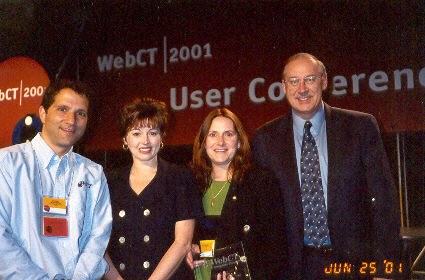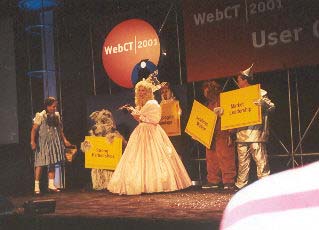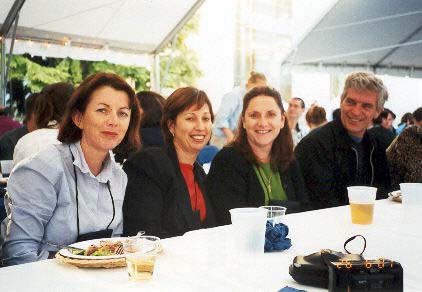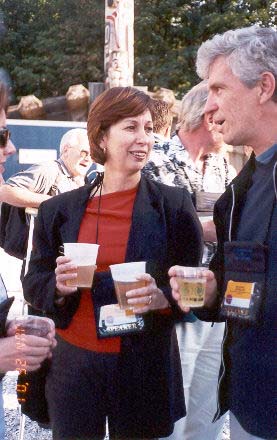I had to get to Vancouver early to take advantage of the once a week cheap flight, so I was one of those who felt they knew the city well by the time the conference started. Actually, for me, and others involved in the the pre-conference online discussions (thanks to Lisa Rennery for all her work in setting these up), the conference was already two weeks old by the time delegates began to assemble at the Hyatt.

A heavily booked weekend of training sessions went ahead after a late scare when 260 PC's kindly donated by Compaq failed to show up at the appointed time. But with the usual WebCT flair for calm in a crisis, the machinery eventually arrived and the workshops got rolling on schedule.
The opening night was virtually the Murray Goldberg show, which no one minded as Murray makes a great host. He and Sasan Salari engaged in the now ritual mutual character assassination, and winners of the exemplary courses program were announced and duly rewarded and applauded. South Australia's own Catriona Ward was recognised for her Customising an Online Course training module, and Marty Cielens (TAFE SA) and other panellists were publicly thanked for their part in the evaluation process.

I found each of the keynotes valuable, but must confess I got less from individual break out sessions, though others' enthusiasm might indicate that I simply have a talent for choosing the less inspiring sessions. I was particularly pleased to hear Richard Katz, author of "Dance with the Devil", but it was unnerving to read a Kit Taylor quote from his presentation: "Online education will be capital's beachhead into education." (As much as I love this medium, I do suspect at times that this whole thing is just a capitalist plot!)
Of the break out sessions I attended, Mark Schuler's presentation on a Religious Studies course at Concordia College was the most impressive. Charles Coe's session on Merlin (Northern Alberta Institute of Technology), an institute wide database of learning outcomes and associated learning activities is an indicator of how institutions can house all their content in a way that makes repackaging easy, was also instructive. Those who attended the presentation by Clare Billman (Medical College of Georgia) came away with a series of useful SQE (simple, quick and easy) instructional templates. As a general comment though I thought many sessions had a "look what we're doing - isn't it great?" feel, rather than a true sharing of experience in the vein of "this what we're doing and our experience may be useful for you".
For me the conference was valuable more for getting a global idea of where everyone is at, and what key issues are emerging. One constantly recurring theme astounded me. I couldn't believe the number of references to web enhanced campus based classes. There is nothing wrong with this. In fact I think this is the path we should be travelling, but it really does seem like true online education as it was initially conceived, is almost dead. I would really like to know if others had this impression from the conference. How many sessions addressed online classes where students are 100% remote? This conference was sub-titled Transforming the Educational Experience, but what I sensed more was a transformation of the online experience.
What this does confirm is that TAFE SA is on the right path. Through encouraging the use of WebCT communication hubs we have been able to assist our lecturing staff in incorporating online technologies into classroom practice, but we still have a long way to go. The gap between us and the 'opposition' is closing. More and more institutions are beginning to add multimedia to their courses (voice, instant messaging, voice email, streaming audio and video) and if we allow our current firewall restrictions to continue to hamper enriching our courses, then this time next year we may have no right to claim that we are in any sense a leader in best online practice.
One presentation I did find inspiring (and entertaining) was by Steve Roberts (ex -TAFE) on the final day. Steve swears that he did not have the inside gen on the next generation of WebCT (Cobalt), but many of Steve's prophetic wishes were mentioned in the list of features of the new WebCT to be released sometime next year.
Carol Vallone (WebCT CEO) outlined future directions at the closing session, and then she, Murray, Sasan and other company notables proceeded to humiliate themselves as characters in a spoof of The Wizard of Oz, or the Wonderful World of WebCT, and left us all smiling. WebCT referred to us all present as the 'WebCT family', and it is these touches of light hearted buffoonery that make that notion quite an appealing one.

No description of this conference would be complete without mention of the superb conference dinner. Held in the grounds of the Museum of Anthropology at the University of British Colombia, we all swooned in awe at Vancouver harbour, the mountains beyond, and the setting sun. You don't need a conference to get yourself to Vancouver - the city itself is show enough - but holding the conference dinner outside, in that setting, was a masterstroke.
|
TAFE SA delegates: (from left) Rita Bennink, Deb Bennett, Catriona Ward, and Michael Coghlan |
(Deb likes a beer or two!) |
(for more pix go HERE)
To all the folks at WebCT, thanks for a great conference. OK, so I missed many of the inspiring sessions, and forgot to note that the exhibitors and sponsors would not be there on day 3 (I heard really good things about several booths - Tegrity, Kiko's Knowledge Network, and Horizon Live to name a few), but it's a great way to meet colleagues, put faces to names, and see where online education is heading. And it's obviously heading back to the classroom.
Michael Coghlan
July 2001

